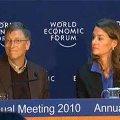Gates Foundation Pledges $10 billion for Vaccine Research
The Bill and Melinda Gates Foundation Friday pledged $10 billion dollars over the next 10 years to research and develop new vaccines. The announcement came at the World Economic Forum in Davos, Switzerland.
It was 10 years ago that Bill and Melinda Gates first made their commitment to vaccine research. It led to the creation of the Global Alliance for Vaccines and Immunization, or GAVI.
“Over these last 10 years, the success of both increasing vaccine coverage and getting new vaccines out has been phenomenal,” he says.
Redoubling Commitment “Over this last decade we've spent $4.5 billion on vaccine research and delivery. And today we're announcing a commitment over this next decade, which we think of as a decade of vaccines having incredible impact – we're announcing we'll spend over $10 billion on vaccines,” he says. Despite the amount of the foundation's pledge, Gates says it's not enough to develop all the vaccines needed in the developing world. “We need the increased generosity of the rich world governments. The amount of aid that goes to health and vaccines in particular has gone up and it needs to go up even more. We need help from the developing countries as they put priority on this in their budgets and the quality of their delivery systems to get out and reach every child,” he says.
And he calls for more public/private partnerships that include the major pharmaceutical companies.
Life saving and cost effective Melinda Gates explains why the Gates Foundation is renewing its pledge to support vaccine research and development. "It's really because of what Bill and I have seen that's been possible – the amazing life-saving advances of this technology of vaccine and the success of the GAVI Alliance and what they've really done the last 10 years,” she says. She says there used to be much lag time between the time a vaccine appeared in the U.S. or Europe and the when they became available in poor countries.
“That amount of time is starting to come down. We were also quite surprised when we first started looking at vaccines – that they were such a life-saving advance. They were so effective and cost effective and yet immunization rates were on the decline if you look back 10 years ago,” she says.
However, she says in the last nine years, immunization rates – for such diseases as diphtheria, tetanus and pertussis – have risen sharply.
“The vaccine rate has jumped worldwide from 66 percent to 79 percent. That means more children who are staying alive because of these basic vaccines, Gates says.
Polio, once in 125 countries, is now endemic in four, she says, and is on the verge of eradication.
Melinda Gates says with the investment by the foundation and its partners, the deaths of eight million children would be prevented over the next nine years. She is also confident a malaria vaccine will eventually be developed.
Julian Lob-Levyt, chief executive officer of GAVI, says there have been many successes since the alliance's creation. “More than 250 million children have been immunized. And the latest data that we're releasing today from WHO (World Health Organization) five million deaths have been prevented with that kind of support. Those are phenomenal sums. In sub-Saharan Africa now nearly 80 percent of kids are getting their three shots of vaccines,” he says.
The announcement by the Gates Foundation was made at the World Economic Forum, which runs through January 31st.

